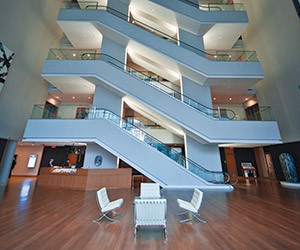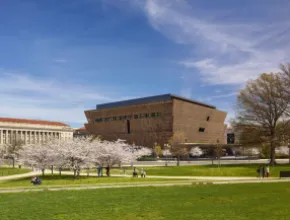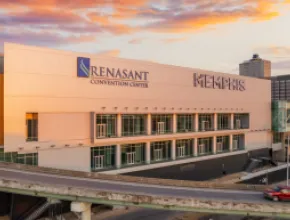The “Queen City” is brimming with culture and creativity, from large venues like the Levine Center and Romare Bearden Park, to funky neighborhoods burgeoning with local artists. World-class facilities like Bechtler Museum of Modern Art and the Gantt Center for African-American Arts + Culture offer unique event space within blocks of the Charlotte Convention Center. Over the past decade, neighborhoods like NoDa and Historic South End have added enough galleries, studios and performance spaces to host monthly art crawls packed with local flavor—including the flavors of local microbreweries.
“Charlotte’s walkable cityscape is complemented by a number of easy-to-access cultural institutions that enrich a meeting attendee’s experience during downtime or special events beyond the Charlotte Convention Center,” says Laura White, director of communications at the Charlotte Regional Visitors Authority. “While all are distinctly different, they each embody the vitality and character of the “Queen City” and show just how essential cultural institutions are to Charlotte’s identity.”
Comprising four separate facilities, Levine Center for the Arts is the most prominent cultural institution in Charlotte. The 145,000-square-foot Mint Museum Uptown showcases craft, design, contemporary art and stunning collections of American and European works. The museum offers a 240-seat auditorium, and its lobby and grand room plus terrace can both accommodate 400 for receptions. Bechtler Museum of Modern Art is home to 1,400 objects d’art with a focus on Mid-century Modernism. Its lobby and plaza can host 400 for receptions, while the sculpture terrace can welcome 50. Gantt Center for African-American Arts + Culture celebrates and preserves the cultural contributions of the African diaspora, including visual and performing arts and literature. The entire facility can host events as large as 1,000. The lobby is large enough for 260, and the rooftop pavilion can hold receptions for 200. The 1,191-seat Knight Theater presents Broadway shows and performances by Opera Carolina and the Charlotte Symphony.
Also located in Uptown Charlotte, McColl Center for Art + Innovation combines gallery space with artist studios in a striking, brick neo-Gothic church. The unique, 30,000-square-foot facility is available for event rentals.
Groups will enjoy getting off the beaten art path and exploring Charlotte’s funky neighborhoods for homegrown, handmade art and beer. Both NoDa and Historic South End have become known for their density of galleries, artist studios, performance spaces and microbreweries.
NoDa, short for North Davidson, is located about one mile from Uptown. The area is historically and architecturally significant for its large textile mills, which were built in the early 1900s. Many of these charming buildings have been renovated and repurposed to showcase local artists and performers, as well as microbreweries. NoDa’s neighborhood art crawls are held on the first and third Fridays of every month. Any night, groups can also check out The Evening Muse for live music or Upstage for theater, music, burlesque and spoken word. The latter is a 3,000-square-foot-plus facility with two stages and a dance floor. It is available for special event rentals. While in the neighborhood, groups shouldn’t miss taproom tastings and brewery tours at NoDa Brewing Company and Birdsong Brewing, or group dining at gastropubs Heist Brewery and Growlers Pourhouse.
PageBreak
Just south of Uptown, Historic South End is another former industrial district turned artsy entertainment neighborhood. The South End Gallery Crawl is held on the first Friday of each month, and the weekly Food Truck Friday event finds the city’s most delectable mobile dining options gathering at Camden Road and Park Avenue. Noteworthy art stops include Doma Gallery, which exhibits fine arts photography in a 1920s Cadillac dealership. Local microbreweries include Unknown Brewing Co. and Sycamore Brewing, both of which offer taprooms where private event can be held. Tremont Music Hall hosts acts from Iggy Pop to Ygnwie Malmstein. Its main hall can host events as large as 950, while its Casbah room can host 400.
It’s easy to feel overwhelmed by the diversity of cultural experiences in Charlotte. The best way to avoid choosing is to book a city tour with a variety of stops.
“Groups can also embark on a variety of themed city tours that show off Charlotte’s best cultural attributes,” White says. “These range from culinary journeys around town to Segway or bike tours that showcase Charlotte’s best hidden gems.”
The Party Pedaler is one of the newest and most unique ways to tour Charlotte. The 14-passenger party bike is powered by pedaling, steered by a pilot, and roofed to keep groups dry during rain. Its main routes are Uptown, NoDa and the South End, and stops can be customized to groups’ interests, whether art, food or beer.
FEAST Food Tours and Culinary Events offers walking tours of both NoDa and Historic South End that take in many of the neighborhoods’ culinary and cultural fine points.
On the Racing Insiders Tour, groups journey between NASCAR attractions and shops on a private coach. The tour offers exclusive, behind-the-scenes access to several of the most exciting racing sites in the region.
NASCAR is technically a sport, but to North Carolinians, it is a way of life, an intrinsic part of their state culture. Visiting racing fans will jump at the chance to enjoy the wealth of racing sites here, and outsiders will walk away with a healthy appreciation for the fervor NASCAR inspires.
In Charlotte, the NASCAR Hall of Fame is a must-see. The newly-updated museum, connected to the Charlotte Convention Center, houses more than 1,000 racing artifacts and 50 interactive exhibits. The entire facility can host events as large as 2,400.
Cabarrus County
Charlotte may be able to claim the NASCAR Hall of Fame, but every racing fan knows that Cabarrus County is where racing lives. Charlotte Motor Speedway offers group tours, discounts on tickets, and space for events of almost any size.
Uniting art and racing, Sam Bass is the first artist officially licensed by NASCAR. The Sam Bass Gallery in Concord displays more than 300 pieces of motorsports art.
Nothing will supplant NASCAR’s place as No. 1, but Cabarrus County has plenty of non-racing-related culture to boot.
“Newly relocated alongside the Curb Museum for Music and Motorsports, the North Carolina Music Hall of Fame is full of artifacts that tell the story of our state’s musical history. New inductees and exhibits are welcomed each October,” says Donna Carpenter, president and CEO of the Cabarrus County CVB. “The Galleries and Davis Theatre make Historic Downtown Concord a must-visit for arts and cultural experiences in Cabarrus County.”
Built in 1876, Historic Cabarrus County Courthouse is now home to the Cabarrus Arts Council, The Galleries (four art galleries), Curb Museum for Music and Motorsports, and the North Carolina Music Hall of Fame. The courthouse offers the 240-seat Davis Theatre for event rental.
Kelly Crumrin is a freelance writer based in the San Francisco Bay Area. Her favorite North Carolina musician is Thelonious Monk.






